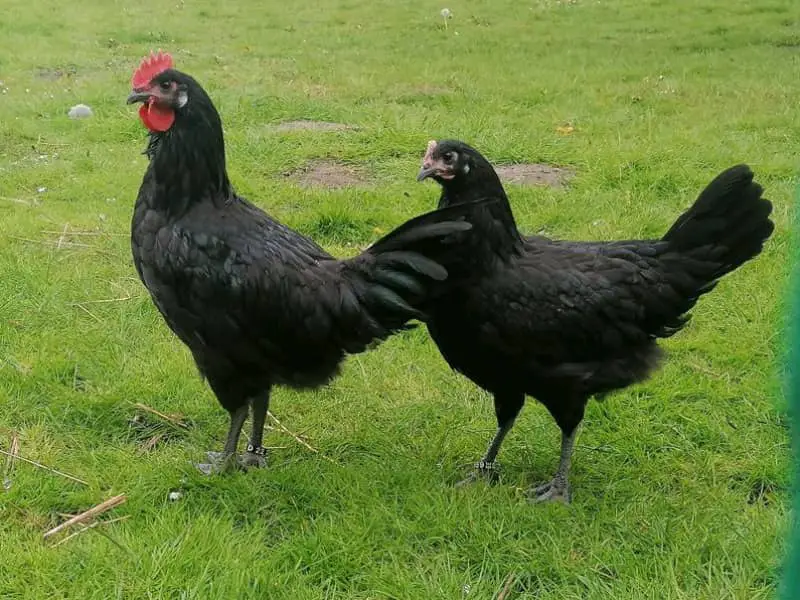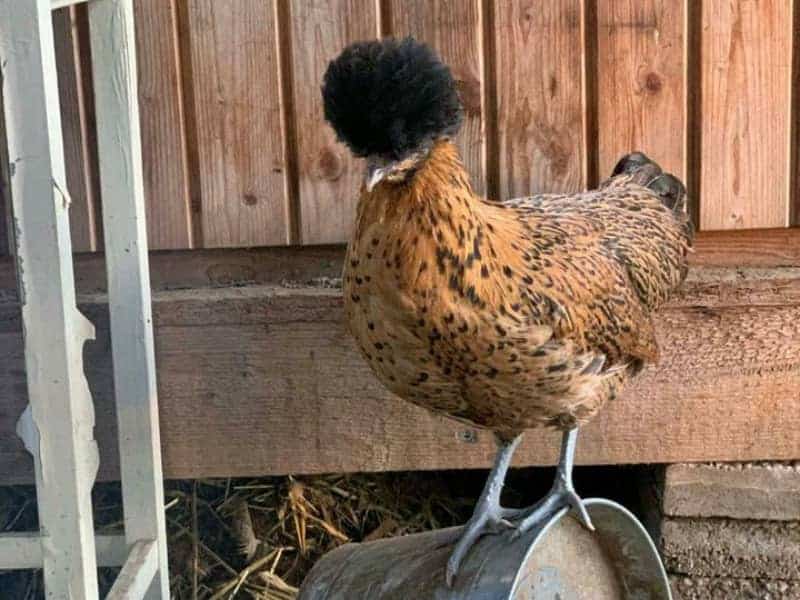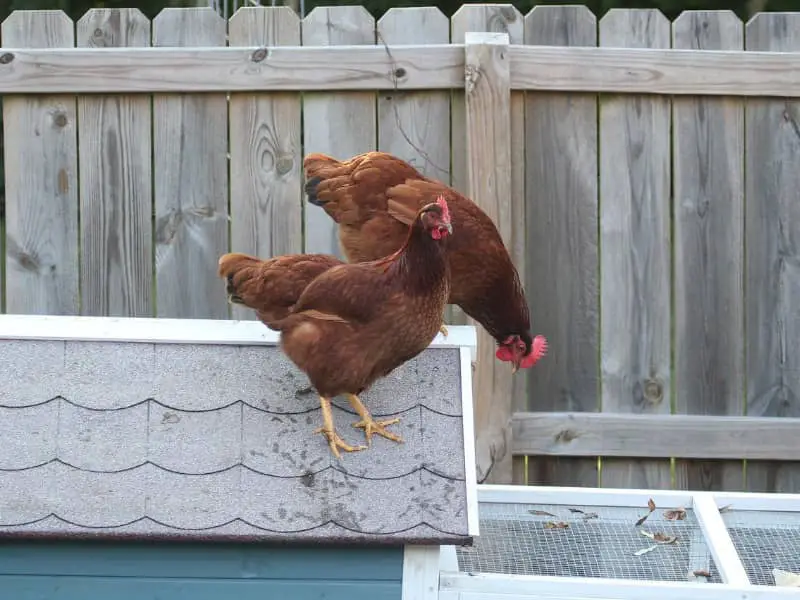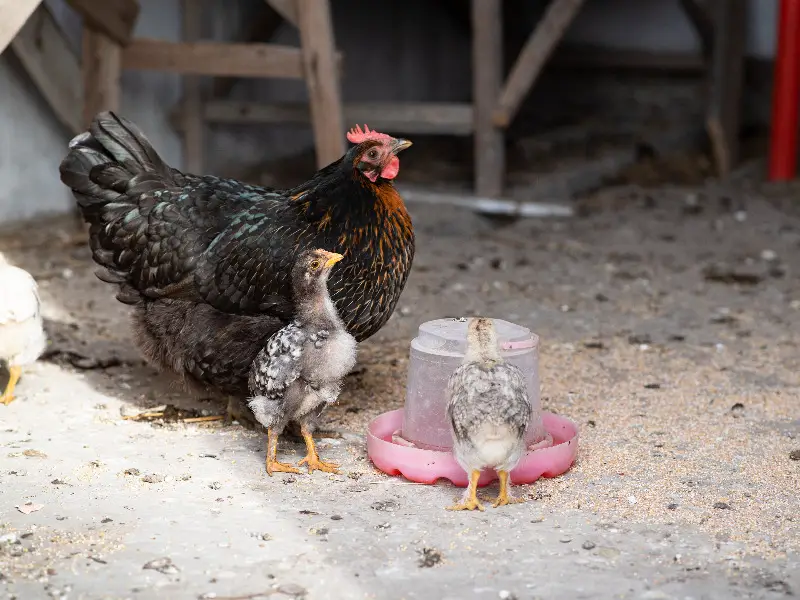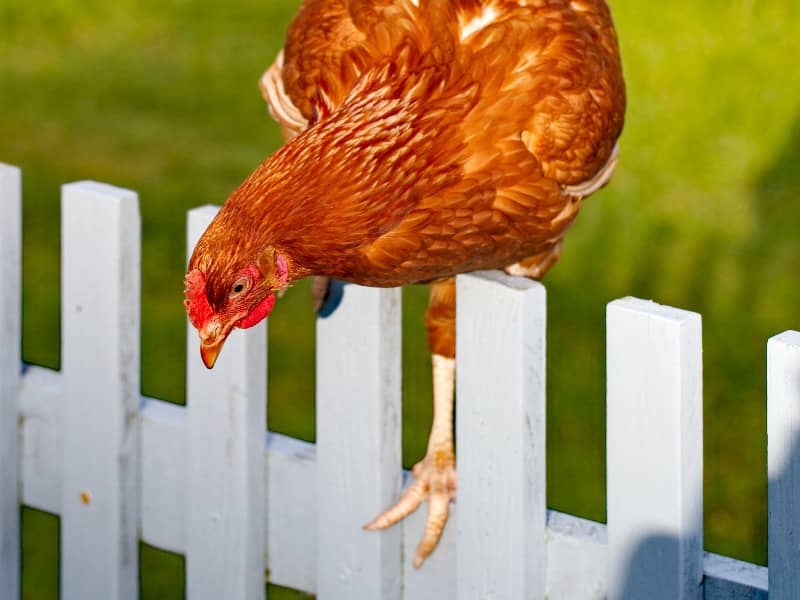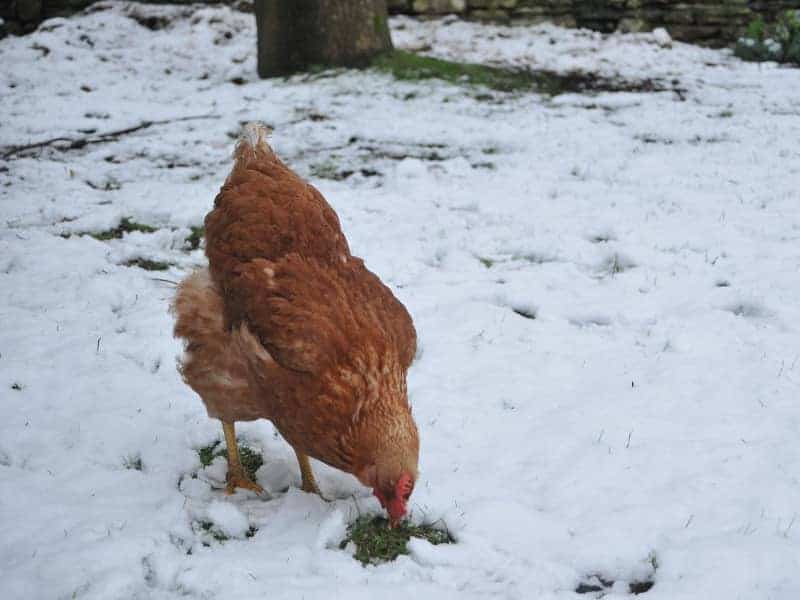
Chickens in winter
Chickens and poultry in general are extremely robust and cope excellently with the cold. Nevertheless, you as an animal owner must provide for your chickens in winter. This means that the free range and the coop is winterized and prepared for the cold season. Here we provide you with an overview of the measures you should take to ensure that your animals are healthy and happy during the cold season.
Chicken coop in winter
The coop for your chickens must be dry, clean and 100 % free from drafts. Draughts make the chickens move closer together and sleep worse. Poor sleep in turn ensures that there is more aggression in the group and the general well-being of the chickens suffers. Visually, this can be seen in a dull plumage, also the laying performance will decrease.
But even in winter temperatures, it is necessary to ensure that the stable is always dry. Ventilation openings such as windows must therefore be opened during the day to get the moisture out of the stable. If this is not possible, then a frequent change of bedding is appropriate. You can recognize the humidity by fogged window panes or condensation on the walls.
Here you should act immediately and provide ventilation. When building a chicken coop, you should therefore always make sure that the coop can breathe. To absorb the moisture, absorbent litter is particularly important. The litter absorbs the moisture and can be quickly replaced as needed. Short straw or straw granules should be used here.
The regular exchange ensures a pleasant and dry climate in the coop. Your chickens will thank you for this not only in winter.
Frostbite in chickens in winter
As we have already described at the beginning, chickens are extremely robust animals. Cold only bothers you less and temperatures of -10 or -15° impress a healthy chicken only little. Where chickens and especially roosters get problems is high humidity. Here, even low minus temperatures can cause frostbite on the wattles and the comb.
That is why dryness is so important in the coop. Some chicken owners hang a hygrometer in their coop to determine the humidity. The humidity in the chicken coop in winter should be about 60 %. Here, with outside temperatures as low as -15°, there should be no problems. In summer, in turn, that the humidity should also be somewhat higher, that so also a dust formation in the chicken coop is counteracted.
If you have trusting chickens and are worried about frostbite on wattles and combs. Then you can apply a water-free grease cream, such as milking grease, to the areas on your animals. This reduces the risk of frostbite massively, but is associated with a high effort.
Drinking water for chickens in winter
Especially in severe sub-zero temperatures, the supply of drinking water is problematic. In the usual chicken drinkers, where the water stands flat, this also freezes very quickly. This can be remedied by a so-called drinker warmer. This is easy to install, it is simply placed under a poultry drinker and gives off a slight heat so that the water does not freeze.
What you do need, however, is a power outlet nearby to supply power to the drinker warmer. Some of the devices also work with 24 V and could thus theoretically be supplied with a 24 V battery. An acquaintance of ours has installed an electrical installation via solar with a 24 V voltage for the operation of his drinker warmer and the chicken flap.
This is certainly the luxury option, but provides water and electricity at his chicken house all year round. The drinker warmer alone is not a luxury purchase. The devices are already available from 25 € and should be part of the equipment of your chicken house in a winter with sub-zero temperatures.
A tip from us: Place two ping pong balls in an open water bowl and fill this bowl with cold water so that the ping pong balls float well in it.
You're probably wondering now why table tennis balls in a water bowl for chickens in the winter. The effect is that the ping pong balls move and thus keep the surface in motion. So the water can not freeze so quickly. However, at temperatures below -5 ° C, this effect is no longer given. Then only a drinker warmer helps.
Why the water should be poured in cold has to do with the Mpemba effect. Since I am not a physics teacher, here is the link to a Wikipedia article, which explains it in detail.
The outdoor area in winter
As long as there is a closed snow cover in winter, your chickens will feel right at home and enjoy pecking and scratching in the snow. However, if there is no snow cover, then the chicken garden will quickly become a quagmire and water will stand in puddles. In these areas, germs and parasites can multiply unhindered and infest your animals.
Here are different ways to ensure that your chickens can stay in dry area in the winter. The simplest option, which is also useful for the summer, is to install a large weatherproof roof directly on the chicken coop. In winter this roofing provides dry areas and in summer your chickens have a nice place in the shade.
However, boggy areas can also be filled with wood chips and, last but not least, it may make sense to demarcate individual areas of the outdoor area. Some chicken owners also lay thick planks in their chicken garden in order to get to their animals themselves with clean feet.
When should chickens be outside in winter?
As in summer, chickens become active with the onset of daylight. Some earlier, some later, but as a rough guide this rule works quite well. Now it's up to you whether you let your chickens outside immediately at the first light of day in winter. This is possible, but your chicken coop should also be large enough so that the animals can stay there together for a few hours without stress.
This is mainly important when there is a very unpleasant weather outside. This can be a storm, heavy snowfall or simply freezing cold. Here the animals then like to retreat into their chicken house and therefore there should be enough space. The times can be flexible and the chickens do not always have to be outside in the morning at first light.
However, you must keep in mind that the less daylight there is, the lower the laying performance of your animals. You can of course address this situation with a chicken flap that responds to daylight. These two points, laying performance and chicken flaps in winter, will be discussed in the next two paragraphs.
Laying performance of chickens in winter
The laying performance of chickens in winter is known to decrease. This has nothing to do with the fact that it is cold, but has to do with the duration of sunlight/daylight. The less light a chicken has, the more it curbs egg production. If egg production is important to you, then you can counteract this decline with lighting in the coop.
Even low wattages achieved by a simple LED lamp in the coop can encourage the chickens to produce more eggs. You can set a timer so that the light in your chicken coop comes on at 6:00 in the morning and burns until 8:00. At 8:00 am the chicken flap opens and it is already light outside and the animals can go outside. In the evening this can be done in the same way.
This simple measure can increase egg production by up to 20 %. This method is even used by organic farmers in order not to have too high a loss of egg production during the cold season. The LED lamps can often be coupled with a battery and so a mains connection is not always necessary.
But why is this light so important for the chickens to lay eggs? The reason is that the body of the chickens produces eggs only when they are active. As soon as the chickens sit on the perch and rest, this production is interrupted. However, if a chicken has light, it is active and production is underway. Thus, professional chicken farmers often turn on the lights for 14 hours a day.
However, those who can do without the extra eggs in the winter, should do without this lighting. Because in this way the natural rhythm of the animal can be lived. Especially in the breeding area, where it is a question of good and strong offspring, the lighting is largely dispensed with.
Chicken feed in winter
In winter, the feed should be adapted to the conditions. Thus, in the case of severe cold, high-fat feed is useful. These can be nuts, sunflower seeds or even oatmeal. Some breeders even add some oil over the feed to make it more energy-rich. Others swear by brewer's yeast. This has many minerals, amino acids and contains vitamins, primarily from the B group.
These strengthen the immune system and boost the metabolism, they also have a good effect on the intestinal health of your animals. Since the animals find little food outside in winter, you need to supplement it. This includes offering shell limestone and possibly laying out small stones that animals need for crushing in their stomachs.
Your chickens will be happy about any green fodder in winter and will pounce on it enthusiastically. If you do not have the possibility to grow or offer green fodder yourself, then you can also fall back on pick sticks made of alfalfa. These are gladly accepted by almost all chicken breeds and are consumed in no time.
Winter employment offer
Since the chickens can be less active in the winter, since there is hardly anything to peck and scratch, as chicken owners offer your animals employment opportunities. Because without sufficient employment, depending on the mix of the group, stressful situations and aggressive behavior can occur. Some suggestions that are easy to implement, we would like to present to you.
Allow the animals to dust bath, as in the summer. Many owners of chickens have solved this by placing a tub in a dry area, which is covered, where fine sand is kept. It is important that this sand never gets wet. Therefore, only offer in a covered area, in a pinch, directly in the coop and check regularly.
Cooked kitchen scraps are not only a treat for your animals in the summer, but a good employment option in the winter. We have had good experiences with potatoes here and have been given old potatoes from a certain point by our neighbors who knew we were feeding them to our animals. As compensation there were a few of our eggs and both sides were happy.
There are Stainless steel food balls, which can be filled with green fodder. Originally, these balls were designed for rodents. But now many chicken owners hang them in the winter, so that the animals have something to do and a little effort to get to the food.
Instead of the feed balls, you can string vegetables on a string that the chickens have to pick from the string in winter. This way you can keep your animals busy over a long period of time and keep the activity high. By the way, how about a Chicken swing in the stable. This is very gladly accepted and can then be placed outside in the summer.
To keep the activity of your animals high inside the stable, you can distribute him litter food that they have to look for there. Very popular here in winter are mainly the sunflower seeds, but also other grain food is gladly accepted by the animals.
Author

-
Garden animal - A life with nature
Welcome to my animal blog! My name is Dirk and I am happy to take you on my journey through the fascinating world of animals and gardening.
Born 54 years ago, I have had an insatiable curiosity for the animal world around me since childhood. Although I have moved professionally in other industries, my true passion has always been animals and nature. It is remarkable how a small garden has become such an important part of my life.
Many of my fondest memories are associated with the animals that share our home. Whether it's the curious squirrels that scurry across the trees in the morning, the colorful variety of birds that visit our feeders, or the busy bees and butterflies that pollinate our flowers, every moment with them is invaluable to me.
This blog is my contribution to share my experiences, discoveries and insights with like-minded people. Here I will share stories of unforgettable encounters with animals, give tips on gardening and creating wildlife-friendly habitats, and take you on my journeys through nature.
Thank you so much for being here!
Cordial,
Dirk aka garden animal
Last posts
- 27. February 2024PetsVeganes Hundefutter – Grün und Gesund?
- 18. January 2024ChickensOregano für Hühner
- November 27, 2023HamsterDiurnal hamsters
- November 24, 2023HamsterHamster hammock

